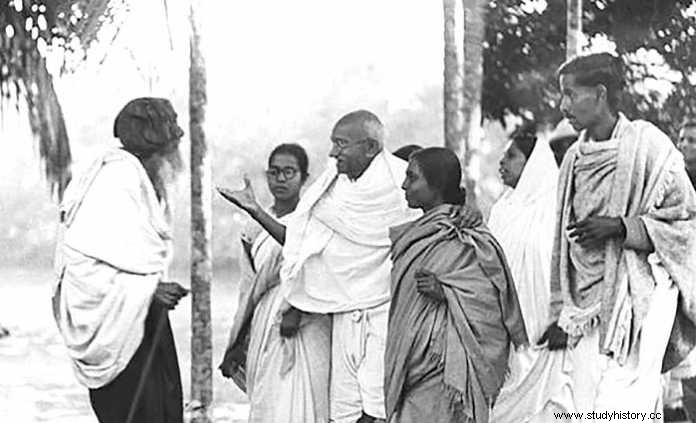
In the First World War (E.1914-19), Turkey fought on behalf of Germany and against the British. Ulemas and clerics around the world considered the Sultan of Turkey as their caliph, that is, religious and political leader, and Turkey was their religious center. The British also stunned the Indian forces in this war, which were sent against the Caliph of Turkey. Indian Muslims were also in these armies. It was a strange situation. Indian Muslims wanted to fight on the side of the Caliph of Turkey but they had to fight against the Caliph because they were part of the British army.
Indian Muslims feared that if Turkey was defeated in the war, the Turkish Empire would be disintegrated and the powers of the Caliph would also be abolished. Therefore, Indian Muslims organized Khilafat Committee as soon as the war broke out and opposed sending army against Turkey and Khilafat movement against British in India. Driven. The British government of India placed the leaders of the Khilafat movement Muhammad Ali and Shaukat Ali under house arrest.
In those days Gandhiji started the non-cooperation movement in India. Gandhiji appealed to the Muslims to adopt this program of the Congress. In return, Gandhiji assured support to the Khilafat movement. Since the objectives of Hindus and Muslims seemed to be the same in the politics of this period, the Muslims decided to cooperate in Gandhiji's non-cooperation movement. The Congress also openly started supporting the Khilafat movement. Within a few days both the movements got united.
Yagnik has written- 'Gandhi started making indiscriminate speech on the question of Khilafat and he went ahead of the Muslims in the jihad of defense and liberation of Islam.'
The Old Kingdom of Turkey was torn to pieces by a treaty after World War I. Sultan Abdul Majid's power over Iraq, Mesopotamia, Syria, Palestine and Smyrna was abolished. Part of the Turkish Empire was given under the protection of France and one under Britain. Istanbul and Darra Daniyal were placed under international control. The coast of Smyrna and Antolia was merged with Greece. This treaty acted as a sprinkling of salt on the wounds of Indian Muslims and once again the Khilafat movement gained momentum.
The Muslims wanted that the Arab countries and the holy places of Islam should remain under the authority of the Caliph in the same way as their boundaries have been set by the Islamic State, but when Gandhiji suddenly suspended the non-cooperation movement in AD 1922 due to the Chauri-Chaura incident. Then the Muslims severely criticized Gandhiji and the communal unity established by the Lucknow Pact was destroyed again.
A section of Muslims was already vehemently opposed to the Lucknow Pact. This class feared that Gandhi's leadership would end the separate existence of Muslims. During the Khilafat and non-cooperation movement, these leaders were beginning to feel that the interests of the Muslim leaders were not being fulfilled by this unity; That's why he openly vomited venom towards Gandhiji and the vehicle of Hindu-Muslim unity got derailed again.
The Congress was dominated by Hindu leaders and Gandhiji was their universal leader. Although Gandhiji did not let any opportunity to win the trust of the Muslims with his hands and kept the Quran over the Gita in the drawer of his desk, he remembered more verses of the Quran than Jinnah, however the Muslim leaders who practiced communal politics believed that Gandhiji's great insistence on truth and non-violence is inspired by the ideals of Hinduism.
Therefore, Gandhiji's leadership to Muslims is invalid. Many educated radical Muslim leaders were against Gandhiji. He believed that Gandhiji's previous record in the matter of betrayal of Muslims was also not good.
Gandhiji in AD 1907 in South Africa General Smuts The movement which was launched against the government of India, it was stopped midway. The Indian Pathans of South Africa had launched a fatal attack on Gandhiji, considering this act of betrayal.
Thus Muslims supported Gandhiji's non-cooperation movement in AD 1920, despite not having faith in Gandhiji, because Gandhiji had said that 'If the country follows me, I will bring Swaraj within a year' But when Gandhiji suddenly stopped the non-cooperation movement in AD 1922, the Muslims felt that Gandhiji had betrayed once again, leaving the Muslims in the middle.
The separatist Muslims propagated all over the country that 'Gandhiji misled the Muslims for the fulfillment of his selfish interests.' Due to this, there was excitement in the country and communal riots started.
